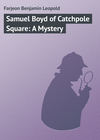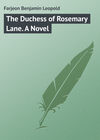Loe raamatut: «Samuel Boyd of Catchpole Square: A Mystery», lehekülg 11
CHAPTER XXIV
DR. VINSEN TAKES AN INTEREST IN DICK
The admonition was needed, for his brain was in a whirl. The disclosure of Reginald's movements made by Florence, his statement to her that he had an idea for improving his circumstances which he intended to carry out "whatever came of it," his silence regarding his visits to the house in Catchpole Square, his fevered ravings about his father-were, as Dick said with a groan, "so many nails in his coffin."
"No doubt can exist," he argued, "that Samuel Boyd was murdered either by his son Reginald or by Abel Death. If what I know were made public Reginald would be immediately arrested and charged. Poor Florence! She little knows what is in store for her, and what can't be hidden much longer. But where, where is Abel Death? Is it possible that he also has been murdered? That would make things worse for Reginald. I'll search the house from top to bottom to-night in the hope of not finding his body, for then the chance of his being the murderer would still be open. If Florence's husband is put in the dock we'll make a fight for his life."
Having thus relieved his mind he struck a bee-line for Aunt Rob's house, and his knock at the door was instantly answered by her and Inspector Robson.
"I bring good news," said Dick, in a cheery tone.
"You have found her!" cried Aunt Rob, quivering with excitement.
"Yes, I have found her."
"Thank God-oh, thank God!"
Inspector Robson, pale as death, grasped Dick's hand, and in a husky voice asked, "Is she well?"
"Quite well-and waiting to see you."
Aunt Rob threw on her bonnet and mantle. "Here's your hat, father," she said, almost breathless, "we must go to her at once. Come, Dick, come."
"Stop a minute," he said, laying his hand on her arm, "I have something to tell you first."
"I don't want to hear anything," she cried, sternly. "I want my child!"
"Let Dick speak," said Inspector Robson.
Then Dick related all that Florence had told him, and their joy at recovering their daughter was so great that they had no word of reproach for her. The dear child was found, and they would be once more re-united. What more could they desire?
"They must come here this very day, father," said Aunt Rob. "This is their home till they get one of their own."
He nodded, and the fond parents, accompanied by Dick, hastened to the dear one, with love and forgiveness in their hearts. When they were all together in Florence's room he stood apart, a silent witness of the joyful meeting. How the parents embraced and wept over their child, how she clung to them and kissed them, and entreated them to believe that her love for them was stronger than it had ever been! Aunt Rob's tearful eyes shone with gladness; her one ewe lamb was restored to her; a sacred joy stirred their hearts at this re-union.
Then, when their agitation had somewhat subsided, and they had stepped in softly to see Reginald, who was still asleep, came the question of his removal.
"It must be left to the doctor," said Uncle Rob. "When do you expect him, Florence?"
"He is coming to-night, between eight and nine o'clock," she answered, and added, with a wistful look, "we are very poor, father."
"You share with us, my dear," was his ready response. "All we have is yours. Mother, it is hardly likely he can be removed for a day or two. You will stay with Florence to-night."
"And every night," said Aunt Rob, "till we get her home. I don't let her out of my sight. Dick, what are you looking so glum for?"
"Am I looking glum?" he said, striving to speak cheerfully. "I was not aware of it."
"Dear Dick!" said Florence, stepping to his side. "How can we thank you?"
"That will do, that will do," he said. "As if anybody in my place wouldn't have done the same! I must be off now-a thousand things to attend to."
"Pop into the office between eight and nine for a chat," said Uncle Rob.
"All right, uncle, I'll be there," answered Dick, waving goodbye to the happy group.
He was glad to get away, to think of the work before him. The search in Samuel Boyd's house for the body of Abel Death must be made to-night; it might be the last opportunity he would have to do so secretly.
"I must dodge the police, and I must get in early," he thought. "At nine I will have a chat with Uncle Rob, at ten I'll be in Catchpole Square. My mind is in a state of muddle. Let me see how the case stands in respect of dates and the consecutive order of events. To save confusion I will jot them down."
Taking a small memorandum book from his pocket he halted at a street corner, and made the following entries:
"Friday, 1st March. – Abel Death discharged by Samuel Boyd. He pays a visit to Catchpole Square at about ten o'clock to beg Boyd to take him back into his service. Reginald's two visits to the house, the first in the afternoon, the second late at night, hour unknown. In his haste to get away on the second occasion he drops in the passage the key of the street door. Samuel Boyd murdered. Query-Did Abel Death and Reginald meet? Would it be advisable, when Reginald is in his right senses, to ask him about this?
"Saturday, 2nd March. – Mrs. Death goes to Catchpole Square to obtain news of her husband. Unsuccessful. Good reason for it. Dead men tell no tales. Reginald back in his lodgings, in bed, delirious. The events of the previous night being fresh in his mind, it is likely he raved about them. Query-Who attended to him? His landlady. Did she hear anything that would furnish a clue, and will this occur to her when the murder is discovered?
"Sunday, 3d March. – Mrs. Death repeats her visits to Catchpole Square. Same result. Same reason for it.
"Monday, 4th March. – Mrs. Death continues her visits to Catchpole Square.
"Tuesday, 5th March. – The day of the great fog. My conversation with Uncle Rob in the police station. Mrs. Death and Gracie are brought in. Her story. Florence leaves home secretly to nurse Reginald. Fearing that he is dying, and gathering from his ravings that he wishes to see his father, she goes to Catchpole Square after midnight. She is seen by the police and drops her handkerchief, which Constable Pond picks up. My conversation with Applebee. He tells me that Pond has a room to let. I reconnoitre Samuel Boyd's house, and determine to force an entrance next night. Only one way of getting in, by means of rope and grapnel.
"Wednesday, 6th March. – At the police court with Mrs. Death and Gracie. I write par. for 'L. B. B.' I take lodgings in Pond's house, and obtain possession of Florence's handkerchief. Visit Aunt Rob, and learn particulars of Florence's flight. I purchase rope and grapnel. I visit Mrs. Death. No news of her husband. Make the acquaintance of Dr. Vinsen. He gives Mrs. Death two pounds. Why should he be so generous? At one in the morning I get over dead wall, and into Samuel Boyd's house. Discovery of the murder. Find Samuel Boyd's written accusation of his son. Pocket it. Find Reginald's key to street door. Pocket it. Things look black.
"Thursday, 7th March-Visit Aunt Rob. Receive letter from Florence. Go to her. Fetch Aunt and Uncle Rob. Leave them together. Things look blacker."
Replacing the memorandum book in his pocket he became conscious that he was being observed. Looking up he saw the sleepy eyes of Dr. Vinsen fixed upon him.
"My dear young friend," said the doctor, with an amused smile, "I have been observing you for quite three minutes, and wondering what engrossing task you were engaged upon to make you oblivious of passers-by. An effort of literature-a poem-an inspiration? I envy the literary character. So free, so untrammelled by the ordinary circumstances of our prosaic existence! It soars on the wings of imagination into fairy realms-in-to fai-ry realms. Who knows that you have not in your pocket" – he tapped Dick's breast with a light finger-"something that will open our minds to noble truths? Who knows-who knows?"
"I know," said Dick. "If an account of how many socks, and collars, and handkerchiefs I have sent to the wash will elevate mankind I am sure I have no objection."
"A washing account," said Dr. Vinsen, with a gentle laugh. "Dear, dear, dear! But romance and mystery may be found even in commonplace matters. Look around. Observe the men and women who are passing us. What secrets are hidden in their breasts? In yours? In mine? It occurs to me at this moment to inquire whether mystery is the offspring of romance, or romance the offspring of mystery?"
"You can take your choice," said Dick, attempting to shake Dr. Vinsen off.
"Can one take one's choice?" said Dr. Vinsen, walking by Dick's side, and ignoring his companion's distaste for his society. "Is it open to us to do so? Are we free agents? Are we not rather like boats on a strange sea, with hidden currents that whirl us on, and occasionally bring destruction upon us-des-truc-tion up-on us? Do you happen to be aware if the missing man has returned to the bosom of his family?"
"I am not aware of it. I should consider it very unlikely."
"Then you have a theory concerning his mysterious disappearance." Dick shook his head sullenly. "No? Perhaps you are right not to trouble yourself. I perceive that you are not in the mood for conversation. My dear young friend, I take my leave. If I can be of any service, pray command me."
So saying, Dr. Vinsen raised his hat, affording the world a view of his bald head and his halo, and slowly ambled away.
"Confound you!" said Dick, looking after him. "Why did you raise your hat to me? I am not that kind of man, you know."
His mind was in a state to magnify and distort the simplest matters. To such an extent that the voice of a newsboy shouting in an adjoining street caused him to hurry in that direction to buy a paper. There was nothing in it touching the murder, and he crumpled it up and threw it into the road So he idled away the time until a few minutes before nine, when he entered the Bishop Street Police Station, where his uncle expected him.
"Well, Dick, my lad," said Inspector Robson, "things have taken a turn since our talk the night before last."
"They have, indeed," returned Dick, and thought, "If you knew all!"
"It has been a terrible time," said the inspector, "and we owe you what we can never repay."
"You make too much of it, uncle. What did I do but go to Florence when she asked me? Did you stop long with her?"
"Till the last minute. Had tea there. It's a blessing the mystery's over; it almost drove me mad. It isn't a pleasant reflection that Reginald is the son of such a man as Samuel Boyd, but it would be hard lines to blame children for the faults of their parents. Have you seen Mrs. Death and her little girl?"
"Yes," replied Dick, "I have been twice to their lodgings, and they have heard nothing of the missing man. They are in great poverty-there are seven little children-"
"Poor creature! How's the little girl?"
"There's a chance of her getting well. A friend has unexpectedly turned up, and a doctor is attending her."
Then he related all that he knew of Dr. Vinsen.
"Have you ever heard of him, uncle?"
"Never; he must be a kind gentleman, and I'm glad such a piece of good fortune has fallen to Mrs. Death's share. I wish we could find her husband for her. Dick, now that Reginald is connected with us, a watch ought to be kept on the house in Catchpole Square. Constable Applebee says it looks as if it was quite deserted. If it remains so a day or two longer I shall consider what is best to be done. Abel Death and Mr. Boyd are mixed up together in my mind, and some steps should be taken to clear the mystery. You remember what you said about murder-do you still hold to it?"
It was an awkward question, and Dick gave an evasive reply.
"You might have a look round Catchpole Square yourself, Dick."
"I will do so," said Dick, and soon afterwards took his departure.
CHAPTER XXV
LADY WHARTON AT THE FOUNTAIN
A fine starlight night, and the weather fair all over England, especially in Bournemouth where, in their beautiful estate, The Gables, Lord and Lady Wharton are giving their yearly ball. The air is soft and balmy in this favoured southern retreat, and though it is too early yet for the rhododendrons, the gardens are bright with flowers. Guests are riding to The Gables from all parts of the county, for this annual function is eagerly looked forward to by the belles and beaus of Hampshire. At eleven o'clock they begin to arrive, and by midnight the nineteenth century revelry is at its full height; at which hour my Lady Wharton, deeming that she has done her society duty, ceases to receive at the top of the grand staircase, and strolls into the grounds to welcome her tardy friends. Lord Wharton, happily convalescent, but still weak, and, as some whisper, not so strong in his intellect as he might be, is in the card room, where, propped up by cushions, he is entertaining a few choice guests by dropping his guineas to them. My lady's brother, Lord Fairfax, has also contributed to their entertainment, and, feeling that he has done his duty, he also strolls into the grounds, and flirts. He is in his fourth decade, a handsome gentleman with a blonde moustache, and has not yet made his choice in the matrimonial market; therefore he is gladly welcomed by all the spring beauties here assembled. But he is not an assiduous cavalier, and being weary of most things, is soon weary of languishing glances. Standing by a tiny fountain my lady watches him until he joins her there.
"They do these things better on the Continent," he says languidly.
Some hostesses would have misunderstood him, but she knows he refers to the fountain, and she nods assent. His conversational powers are not remarkable, so he allows her to rattle on for his amusement, putting in an occasional monosyllable as his contribution.
"Did you leave Wharton in the card room?" she asks.
"Yes," he drawls, and hazards three consecutive words. "Your friend arrived?" It is not a question in which he seems to take more than a momentary interest. He does everything languidly; even when he raises his white fingers to caress his moustache, which has been the business of his life, it is done as though the effort were a tax upon his physical powers. This, to many of the opposite sex, is one of his charms.
"Not yet," my lady answers.
"By the way," he says, and either forgets what he was going to say, or finds the effort of a long sentence too great.
"You were going to speak about the old bills?" she asks.
"Yes."
"I wrote to him to bring them to-night. I can't imagine how I forgot to ask him for them when I gave him the new acceptances you and Wharton signed."
"Not-business-woman," he observed, with a pause between each word.
"Don't be ridiculous, Fairfax," she protested, with a merry laugh. "Not a business woman? I should like to know what would become of Wharton if I were not."
"Floored," said Lord Fairfax.
"Indeed he would be. And don't I manage you?"
"Difficult?" he asked.
"Not at all. You are the dearest fellow! I shall be almost ashamed to ask you for another cheque to-morrow."
"Don't. Stumped"
"Next week, then?" He nods. She casts a critical look around. "Our most brilliant gathering, I think."
"Jolly," he says, and, being by this time exhausted, he leaves her at the fountain, where, presently, she is joined by other guests, with whom she carries on an animated conversation.
The grounds, with their thousands of coloured lights, are dotted with the attractive dresses of the ladies and the soberer costume of the gentlemen. Pleasure shows its smiling face, and doors are shut upon black care. No face brighter than that of Lady Wharton, none more free from the least suspicion of anxiety. Her hearty voice rings out, an invitation to mirth and gaiety. And yet as time wears on there is an anxious thought in her mind. "Why does the man not come?" she thinks. "He promised to be here faithfully, and it must be now nearly one o'clock." She consults a jewelled watch. "Yes, it is-one o'clock." The fact is, my lady is pressed for money, and she is expecting to receive a thousand pounds to-night in ready cash, half of which must go to her dressmaker in the morning. For, come what may, my lady must be dressed. So she stands at the fountain, and taps her foot impatiently. Soft gleaming lights, fair sky with its panoply of stars and bright moon shining, sounds of rippling laughter, gay forms gliding and flitting through the lacework of the trees: a fairy scene, made not less beautiful by the dark spaces wherein the pines, their topmost branches silvered by the moon, stand apart, picturesque sentinels of the night.
To my lady a liveried footman, who presents a card. She moves into the light to read it.
"At last!" she says. "Where is the man?"
"He is waiting to see you, my lady."
She follows the servant, and steps into the shadow of a cluster of trees.
* * * * *
What connection is there between that gay scene in Bournemouth and this more sombre scene in Samuel Boyd's house in Catchpole Square, where, an hour after midnight, Dick moves in search of the body of Abel Death? The invisible links are in the air. Will they ever be brought to light and united to form another chain in the mystery?
Dick's search has lasted two hours, and has been conducted with care and patience. It is not alone traces of Abel Death he seeks for; he searches for anything in the shape of incriminating evidence against Reginald, his intention being to take possession of it, and by-and-by, perhaps, destroy it. That by so doing he will be committing a felonious act and frustrating the course of justice does not trouble him. He is working for Florence.
The first room he lingers in is that in which Samuel Boyd lies. No change there. The bed is still occupied by that silent, awful figure, cold and dead. Incapable of aught for good or evil as it is, it exercises a powerful influence over him. He dreads to approach it, and it draws him to its side. He steals from the room, shuddering, and, closing the door, breathes more freely at the barrier between them; but ever and anon, for some time afterwards, he casts a startled look over his shoulder, as though expecting to see a phantom standing there.
The ghostly moon shines through the windows which are unshuttered, and knowing now, from what Inspector Robson said, that an intermittent watch is being kept upon the house, he dare not in those rooms carry a light. In the rooms with shuttered windows he risks a lighted candle, but holds it close to the floor and moves it warily from spot to spot, and shades it with his hand, in order to lessen the chance of its glimmer being seen from without. This makes his task more difficult, and there are moments when he almost regrets having undertaken it.
The wax figure of the Chinaman is still in its chair, holding in its hand the stick of the reign of Charles the Second. The chair is old-fashioned, too, having a grandmother's hood to it, so that the Chinaman sits, as it were, in a cosy alcove, only those standing in front of the figure being able to obtain a full view of its face.
Dick finds no further incriminating evidence against Reginald than that which he appropriated on his last visit. He makes, however, a curious discovery. He has examined every room with the exception of a small room on the same floor as the office, against the outer wall of which is placed the grand piano. The door of this room opens into the passage, and it is locked. His diligent search is rewarded by finding the key of the door, which he opens. The room is simply furnished, a table and two wooden chairs being all that it contains. A large cupboard with folding doors is fixed to the wall, and by pressing a spring he loosens one of these doors. The cupboard is bare of shelves, and affords ample space for a man to stand upright in. There is a sliding panel at the back, about three feet from the floor, and just wide enough for a man to squeeze through. He is surprised to see that the sliding panel leads to the interior of the grand piano, which is quite hollow and contains no wire or wood-work of any kind. The open space is large enough for a man to lie down in, though not without discomfort. The key of the piano is in the inner part of the lock, and by removing this any person concealed there could see into the office, and could certainly hear any sounds of voices or movements made therein, the watcher being so shrouded in darkness as to be quite safe from observation. "Another of Samuel Boyd's tricks," thinks Dick, "for spying upon his clerks." To verify this he returns to the office, and satisfies himself that he has arrived at the correct explanation.
As he stands pondering over this curious discovery, which in the end he dismisses from his mind as of no importance, he finds himself mechanically counting the bottles of wine stacked against another part of the wall. It is done idly, and without meaning, but he does not forget that there are seventy-six bottles, with the crusted dust of years upon them. "Port wine, I should say," he thinks. "I should like half a pint." But he does not yield to the temptation.
At three in the morning his search is at an end. He can do nothing more. He has met with no traces of Abel Death, and he has not found an additional clue.
"I must keep my own counsel," he mutters. "If Abel Death turns up will it be for good or ill? His absence lays him open to suspicion, but it is altogether a case of circumstantial evidence. Supposing him to be caught, tried, and convicted, and he an innocent man-!"
He cannot pursue this supposition to its just conclusion. The image of Florence presents itself, her hands stretched out, appealing to him to save Reginald.
With a sinking heart, and using every precaution to escape observation, he succeeds in getting out of the office by the front entrance. Oppressed by the conviction that he must now wait for the course of events, and that he is powerless to direct them, he is walking out of Deadman's Court when the voice of Constable Applebee falls upon his ears.
"I thought it was you, sir," said the constable. "Have you been looking at the house?"
"Yes," replies Dick, pulling himself together, "from the outside."
"Of course from the outside, sir," says Constable Applebee. "I should like to have a look at it from the inside. People are beginning to talk about it. It's seven days now since anybody's set eyes on Mr. Boyd, and seven days since Mr. Abel Death disappeared. That's what I call a coincidence. I hope it's nothing more than that. Hope you're comfortable in your new lodgings, sir."
"Quite comfortable, thank you. I must be off to them now. Good night."
"Good night, sir."
Dick is by this time thoroughly tired out, and when he reaches his room is glad to tumble into bed.




















